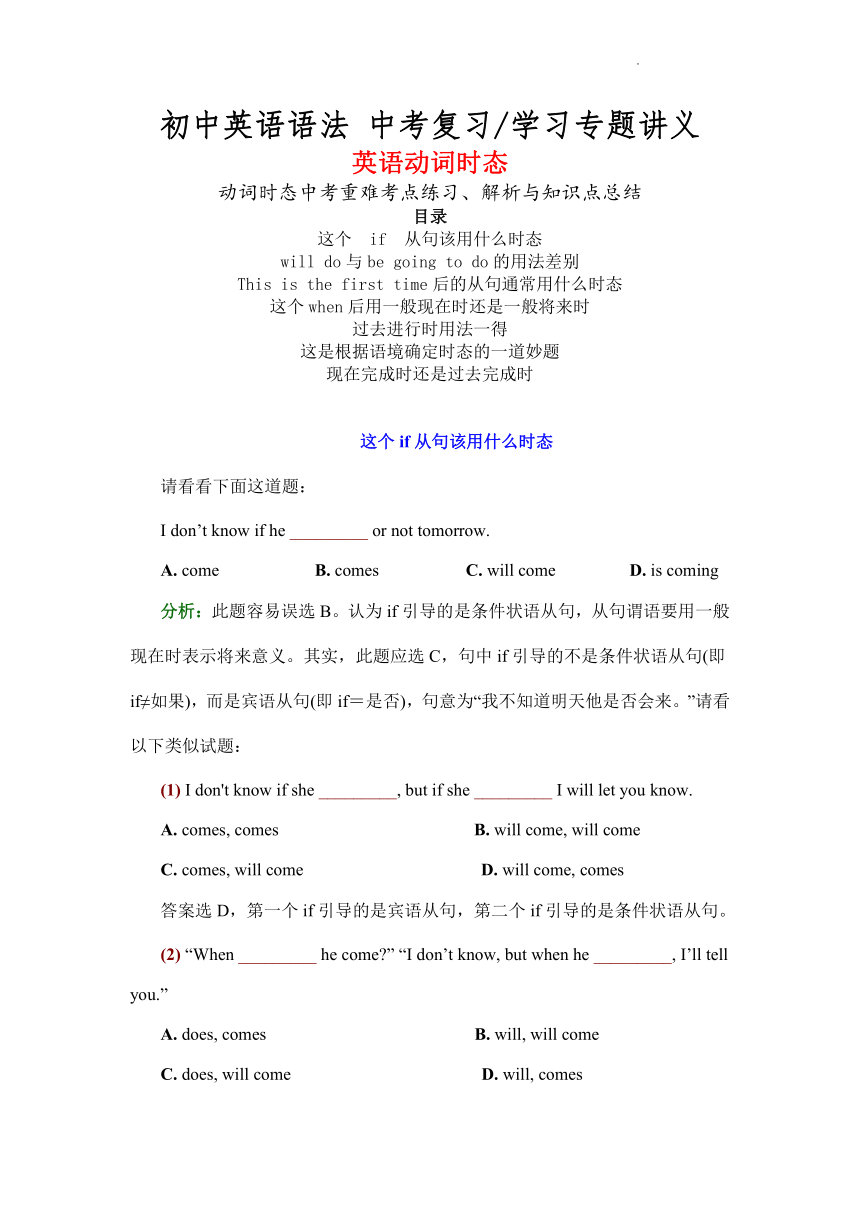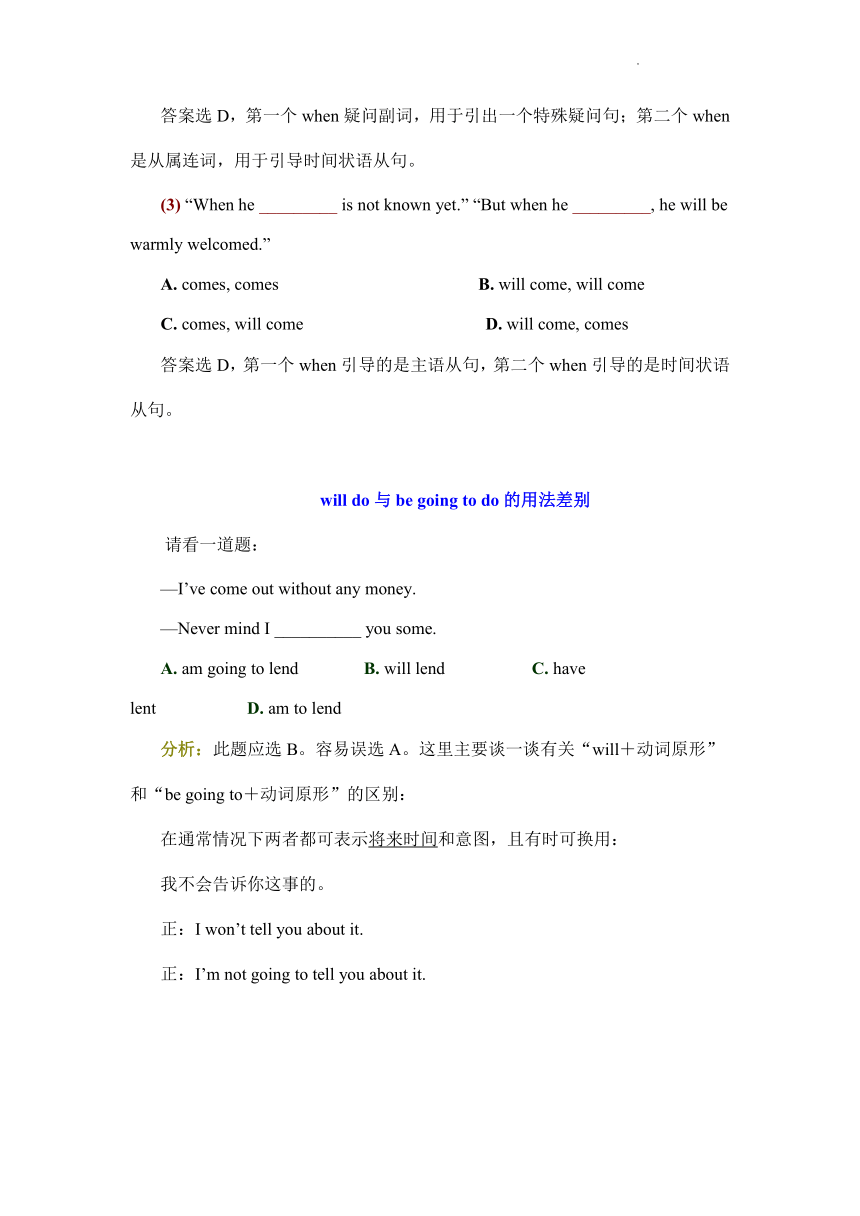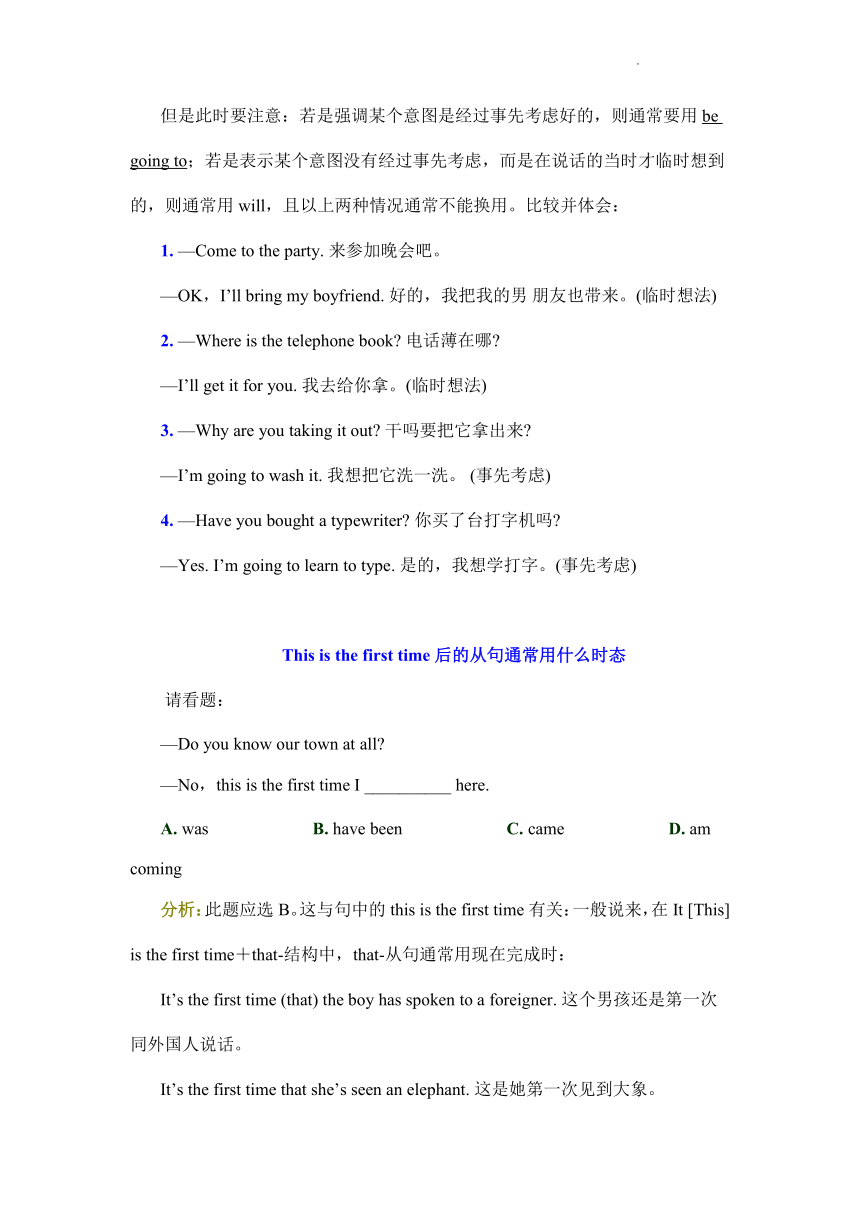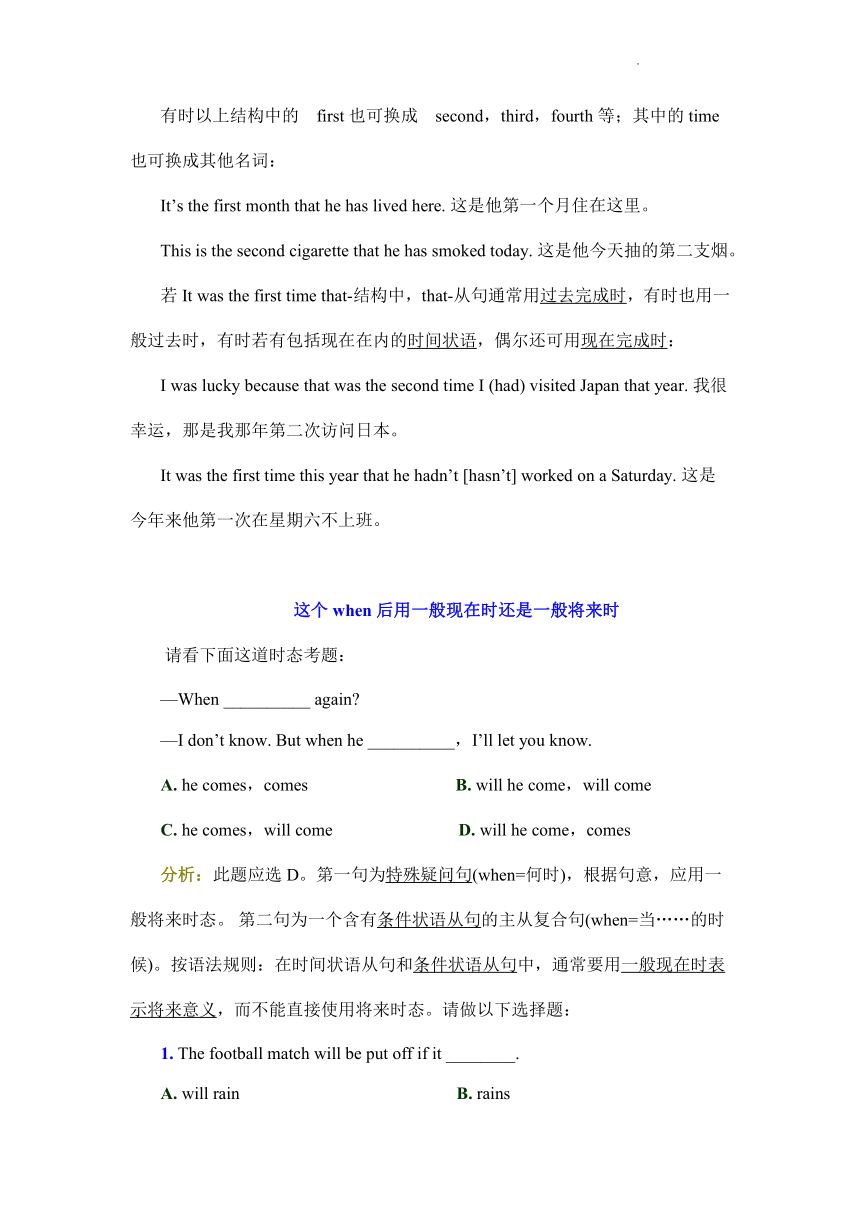2022年动词时态:动词时态中考重难考点练习、解析与知识点总结-2022年中考英语语法复习学习专题讲义
文档属性
| 名称 | 2022年动词时态:动词时态中考重难考点练习、解析与知识点总结-2022年中考英语语法复习学习专题讲义 |  | |
| 格式 | docx | ||
| 文件大小 | 37.6KB | ||
| 资源类型 | 教案 | ||
| 版本资源 | 通用版 | ||
| 科目 | 英语 | ||
| 更新时间 | 2022-04-13 21:07:46 | ||
图片预览




文档简介
初中英语语法 中考复习/学习专题讲义
英语动词时态
动词时态中考重难考点练习、解析与知识点总结
目录
这个 if 从句该用什么时态
will do与be going to do的用法差别
This is the first time后的从句通常用什么时态
这个when后用一般现在时还是一般将来时
过去进行时用法一得
这是根据语境确定时态的一道妙题
现在完成时还是过去完成时
这个 if 从句该用什么时态
请看看下面这道题:
I don’t know if he _________ or not tomorrow.
A. come B. comes C. will come D. is coming
分析:此题容易误选B。认为 if 引导的是条件状语从句,从句谓语要用一般现在时表示将来意义。其实,此题应选C,句中if引导的不是条件状语从句(即if≠如果),而是宾语从句(即if=是否),句意为“我不知道明天他是否会来。”请看以下类似试题:
(1) I don't know if she _________, but if she _________ I will let you know.
A. comes, comes B. will come, will come
C. comes, will come D. will come, comes
答案选 D,第一个 if 引导的是宾语从句,第二个 if 引导的是条件状语从句。
(2) “When _________ he come ” “I don’t know, but when he _________, I’ll tell you.”
A. does, comes B. will, will come
C. does, will come D. will, comes
答案选 D,第一个 when 疑问副词,用于引出一个特殊疑问句;第二个 when是从属连词,用于引导时间状语从句。
(3) “When he _________ is not known yet.” “But when he _________, he will be warmly welcomed.”
A. comes, comes B. will come, will come
C. comes, will come D. will come, comes
答案选 D,第一个 when 引导的是主语从句,第二个 when 引导的是时间状语从句。
will do与be going to do的用法差别
请看一道题:
—I’ve come out without any money.
—Never mind I __________ you some.
A. am going to lend B. will lend C. have lent D. am to lend
分析:此题应选B。容易误选A。这里主要谈一谈有关“will+动词原形”和“be going to+动词原形”的区别:
在通常情况下两者都可表示将来时间和意图,且有时可换用:
我不会告诉你这事的。
正:I won’t tell you about it.
正:I’m not going to tell you about it.
但是此时要注意:若是强调某个意图是经过事先考虑好的,则通常要用be going to;若是表示某个意图没有经过事先考虑,而是在说话的当时才临时想到的,则通常用will,且以上两种情况通常不能换用。比较并体会:
1. —Come to the party. 来参加晚会吧。
—OK,I’ll bring my boyfriend. 好的,我把我的男 朋友也带来。(临时想法)
2. —Where is the telephone book 电话薄在哪
—I’ll get it for you. 我去给你拿。(临时想法)
3. —Why are you taking it out 干吗要把它拿出来
—I’m going to wash it. 我想把它洗一洗。 (事先考虑)
4. —Have you bought a typewriter 你买了台打字机吗
—Yes. I’m going to learn to type. 是的,我想学打字。(事先考虑)
This is the first time后的从句通常用什么时态
请看题:
—Do you know our town at all
—No,this is the first time I __________ here.
A. was B. have been C. came D. am coming
分析:此题应选B。这与句中的this is the first time有关:一般说来,在It [This] is the first time+that-结构中,that-从句通常用现在完成时:
It’s the first time (that) the boy has spoken to a foreigner. 这个男孩还是第一次同外国人说话。
It’s the first time that she’s seen an elephant. 这是她第一次见到大象。
有时以上结构中的 first 也可换成 second,third,fourth 等;其中的time也可换成其他名词:
It’s the first month that he has lived here. 这是他第一个月住在这里。
This is the second cigarette that he has smoked today. 这是他今天抽的第二支烟。
若It was the first time that-结构中,that-从句通常用过去完成时,有时也用一般过去时,有时若有包括现在在内的时间状语,偶尔还可用现在完成时:
I was lucky because that was the second time I (had) visited Japan that year. 我很幸运,那是我那年第二次访问日本。
It was the first time this year that he hadn’t [hasn’t] worked on a Saturday. 这是今年来他第一次在星期六不上班。
这个when后用一般现在时还是一般将来时
请看下面这道时态考题:
—When __________ again
—I don’t know. But when he __________,I’ll let you know.
A. he comes,comes B. will he come,will come
C. he comes,will come D. will he come,comes
分析:此题应选D。第一句为特殊疑问句(when=何时),根据句意,应用一般将来时态。 第二句为一个含有条件状语从句的主从复合句(when=当……的时候)。按语法规则:在时间状语从句和条件状语从句中,通常要用一般现在时表示将来意义,而不能直接使用将来时态。请做以下选择题:
1. The football match will be put off if it ________.
A. will rain B. rains
C. rained D. is raining
2. —Can I join your club,Dad
—You can when you _________ a bit older.
A. get B. will get
C. are getting D. will have got
此时要特别注意分清:由when和if引导的从句是状语从句还是宾语从句:
3. 1) I won’t go if it ________ tomorrow. (状语从句)
2) I don’t know if it ________ tomorrow. (宾语从句)
A. rains B. will rain
C. is raining D. has rained
答案:1. B 2. A 3. 1)A 2)B
过去进行时用法一得
有这样一道题:
I don’t think Jim saw me; he __________ into space.
A. just stared B. was just staring
C. has just stared D. had just stared
分析:此题应选B。主要考查动词过去进行时的基本用法(即动作在过去某一时刻正在进行)。此题的上文设置比较巧妙:前面的主句用了I don’t think(指现在的看法),而其后的宾语从句用的是saw(指过去的动作),也就是说此题的语境是:现在谈论过去的情况,全句意为:我认为吉姆当时没看见我,(因为)他当时正在朝天空看。
1. My brother ________ while he ________ his bicycle and
hurt himself.
A. fell; was riding B. fell; were riding
C. had fallen; rode D. had fallen; was riding
2. Tom ________ into the house when no one __________.
A. slipped; was looking B. had slipped; looked
C. slipped; had looked D. was slipped; looked
3. As she ________ the newspaper,Granny _________ asleep.
A. read; was falling B. was reading; fell
C. was reading; was fallling D. read; fell
4. I first met Lisa three years ago. She _________ at
a radio shop at the time.
A. has worked B. was working
C. had been working D. had worked
5. While I ________ a shower,the telephone rang.
A. took B. had taken
C. had been taking D. was taking
答案:1. A 2. A 3. B 4. B 5. D
这是根据语境确定时态的一道妙题
请看题:
—Excuse me, sir. Smoking is not allowed here.
—Oh, sorry I __________.
A. don’t know B. didn’t know
C. haven’t known D. can’t know
分析:此题应选 B。这是一道很好的测试时态的语境题。此题的情景是:一方提醒另一方不准抽烟,对方表示歉意并说自己不知道。这里的“不知道”显然是指对方“提醒”之前“不知道”(所以用过去时态);假若用一般现在时,则指在对方提醒之后还仍然不知道,这不是很荒唐吗
在做时态试题时,要特别注意上下文的语境:
1. —We could have walked to the station; it was
so near.
—Yes. A taxi ________ at all necessary.
A. wasn’t B. hadn’t been
C. wouldn’t be D. won’t be
2. —Your phone number again I ________ quite catch it.
—It’s 7226109.
A. didn’t B. couldn’t
C. don’t D. can’t
3. —Can I help you,sir
—Yes. I bought this radio here yesterday,but
it _________ work.
A. didn’t B. won’t
C. can’t D. doesn’t
4. —Alice,why didn’t you come yesterday
—I _________,but I had an unexpected visitor.
A. had B. would
C. was going to D. did
答案:1. A 2. A 3. D 4. C
现在完成时还是过去完成时
下面这题该用现在完成时还是过去完成时:
I met Jim last week. We __________ each other for about twenty years since we left Japan.
A. didn’t meet B. don’t meet C. haven’t met D. hadn’t met
分析:此题应选D。不少考生会误选C,因为这句当中有一个由since引导的时间状语从句。确实,在与since状语从句连用的主句中,时态通常是用现在完成时:
He has lived here since he came here. 自从他来到这里,他就一直住在这儿。
We haven’t heard from her since she left. 自从她离开后,我们就一直未收到她的来信。
I have been at his bedside ever since he became ill. 自从他生病以来,我一直守在他床边。
以上各例之所以用了现在完成时,是因为since表示“自从……以来,一直……”,这刚好与现在完成时的持续性用法一致。但是这种用法不是绝对的,有时在特定的语言环境下也可能有例外。试比较:
1. We haven’t met each other for about 20 years since we left Japan.
2. I met Jim last week. We hadn’t met each other
for about twenty years since we left Japan.
第1句用现在完成时,这大家比较好理解。但是第2句用过去完成时,有的考生就感到费解了。其实第2句用过去完成时的主要原因是I met Jim last week. 既然“我上个星期见到了吉姆”,所以“30 年未见面”显然应在“上星期”这一过去时间之前(即“过去的过去”),所以要用过去完成时。
英语动词时态
动词时态中考重难考点练习、解析与知识点总结
目录
这个 if 从句该用什么时态
will do与be going to do的用法差别
This is the first time后的从句通常用什么时态
这个when后用一般现在时还是一般将来时
过去进行时用法一得
这是根据语境确定时态的一道妙题
现在完成时还是过去完成时
这个 if 从句该用什么时态
请看看下面这道题:
I don’t know if he _________ or not tomorrow.
A. come B. comes C. will come D. is coming
分析:此题容易误选B。认为 if 引导的是条件状语从句,从句谓语要用一般现在时表示将来意义。其实,此题应选C,句中if引导的不是条件状语从句(即if≠如果),而是宾语从句(即if=是否),句意为“我不知道明天他是否会来。”请看以下类似试题:
(1) I don't know if she _________, but if she _________ I will let you know.
A. comes, comes B. will come, will come
C. comes, will come D. will come, comes
答案选 D,第一个 if 引导的是宾语从句,第二个 if 引导的是条件状语从句。
(2) “When _________ he come ” “I don’t know, but when he _________, I’ll tell you.”
A. does, comes B. will, will come
C. does, will come D. will, comes
答案选 D,第一个 when 疑问副词,用于引出一个特殊疑问句;第二个 when是从属连词,用于引导时间状语从句。
(3) “When he _________ is not known yet.” “But when he _________, he will be warmly welcomed.”
A. comes, comes B. will come, will come
C. comes, will come D. will come, comes
答案选 D,第一个 when 引导的是主语从句,第二个 when 引导的是时间状语从句。
will do与be going to do的用法差别
请看一道题:
—I’ve come out without any money.
—Never mind I __________ you some.
A. am going to lend B. will lend C. have lent D. am to lend
分析:此题应选B。容易误选A。这里主要谈一谈有关“will+动词原形”和“be going to+动词原形”的区别:
在通常情况下两者都可表示将来时间和意图,且有时可换用:
我不会告诉你这事的。
正:I won’t tell you about it.
正:I’m not going to tell you about it.
但是此时要注意:若是强调某个意图是经过事先考虑好的,则通常要用be going to;若是表示某个意图没有经过事先考虑,而是在说话的当时才临时想到的,则通常用will,且以上两种情况通常不能换用。比较并体会:
1. —Come to the party. 来参加晚会吧。
—OK,I’ll bring my boyfriend. 好的,我把我的男 朋友也带来。(临时想法)
2. —Where is the telephone book 电话薄在哪
—I’ll get it for you. 我去给你拿。(临时想法)
3. —Why are you taking it out 干吗要把它拿出来
—I’m going to wash it. 我想把它洗一洗。 (事先考虑)
4. —Have you bought a typewriter 你买了台打字机吗
—Yes. I’m going to learn to type. 是的,我想学打字。(事先考虑)
This is the first time后的从句通常用什么时态
请看题:
—Do you know our town at all
—No,this is the first time I __________ here.
A. was B. have been C. came D. am coming
分析:此题应选B。这与句中的this is the first time有关:一般说来,在It [This] is the first time+that-结构中,that-从句通常用现在完成时:
It’s the first time (that) the boy has spoken to a foreigner. 这个男孩还是第一次同外国人说话。
It’s the first time that she’s seen an elephant. 这是她第一次见到大象。
有时以上结构中的 first 也可换成 second,third,fourth 等;其中的time也可换成其他名词:
It’s the first month that he has lived here. 这是他第一个月住在这里。
This is the second cigarette that he has smoked today. 这是他今天抽的第二支烟。
若It was the first time that-结构中,that-从句通常用过去完成时,有时也用一般过去时,有时若有包括现在在内的时间状语,偶尔还可用现在完成时:
I was lucky because that was the second time I (had) visited Japan that year. 我很幸运,那是我那年第二次访问日本。
It was the first time this year that he hadn’t [hasn’t] worked on a Saturday. 这是今年来他第一次在星期六不上班。
这个when后用一般现在时还是一般将来时
请看下面这道时态考题:
—When __________ again
—I don’t know. But when he __________,I’ll let you know.
A. he comes,comes B. will he come,will come
C. he comes,will come D. will he come,comes
分析:此题应选D。第一句为特殊疑问句(when=何时),根据句意,应用一般将来时态。 第二句为一个含有条件状语从句的主从复合句(when=当……的时候)。按语法规则:在时间状语从句和条件状语从句中,通常要用一般现在时表示将来意义,而不能直接使用将来时态。请做以下选择题:
1. The football match will be put off if it ________.
A. will rain B. rains
C. rained D. is raining
2. —Can I join your club,Dad
—You can when you _________ a bit older.
A. get B. will get
C. are getting D. will have got
此时要特别注意分清:由when和if引导的从句是状语从句还是宾语从句:
3. 1) I won’t go if it ________ tomorrow. (状语从句)
2) I don’t know if it ________ tomorrow. (宾语从句)
A. rains B. will rain
C. is raining D. has rained
答案:1. B 2. A 3. 1)A 2)B
过去进行时用法一得
有这样一道题:
I don’t think Jim saw me; he __________ into space.
A. just stared B. was just staring
C. has just stared D. had just stared
分析:此题应选B。主要考查动词过去进行时的基本用法(即动作在过去某一时刻正在进行)。此题的上文设置比较巧妙:前面的主句用了I don’t think(指现在的看法),而其后的宾语从句用的是saw(指过去的动作),也就是说此题的语境是:现在谈论过去的情况,全句意为:我认为吉姆当时没看见我,(因为)他当时正在朝天空看。
1. My brother ________ while he ________ his bicycle and
hurt himself.
A. fell; was riding B. fell; were riding
C. had fallen; rode D. had fallen; was riding
2. Tom ________ into the house when no one __________.
A. slipped; was looking B. had slipped; looked
C. slipped; had looked D. was slipped; looked
3. As she ________ the newspaper,Granny _________ asleep.
A. read; was falling B. was reading; fell
C. was reading; was fallling D. read; fell
4. I first met Lisa three years ago. She _________ at
a radio shop at the time.
A. has worked B. was working
C. had been working D. had worked
5. While I ________ a shower,the telephone rang.
A. took B. had taken
C. had been taking D. was taking
答案:1. A 2. A 3. B 4. B 5. D
这是根据语境确定时态的一道妙题
请看题:
—Excuse me, sir. Smoking is not allowed here.
—Oh, sorry I __________.
A. don’t know B. didn’t know
C. haven’t known D. can’t know
分析:此题应选 B。这是一道很好的测试时态的语境题。此题的情景是:一方提醒另一方不准抽烟,对方表示歉意并说自己不知道。这里的“不知道”显然是指对方“提醒”之前“不知道”(所以用过去时态);假若用一般现在时,则指在对方提醒之后还仍然不知道,这不是很荒唐吗
在做时态试题时,要特别注意上下文的语境:
1. —We could have walked to the station; it was
so near.
—Yes. A taxi ________ at all necessary.
A. wasn’t B. hadn’t been
C. wouldn’t be D. won’t be
2. —Your phone number again I ________ quite catch it.
—It’s 7226109.
A. didn’t B. couldn’t
C. don’t D. can’t
3. —Can I help you,sir
—Yes. I bought this radio here yesterday,but
it _________ work.
A. didn’t B. won’t
C. can’t D. doesn’t
4. —Alice,why didn’t you come yesterday
—I _________,but I had an unexpected visitor.
A. had B. would
C. was going to D. did
答案:1. A 2. A 3. D 4. C
现在完成时还是过去完成时
下面这题该用现在完成时还是过去完成时:
I met Jim last week. We __________ each other for about twenty years since we left Japan.
A. didn’t meet B. don’t meet C. haven’t met D. hadn’t met
分析:此题应选D。不少考生会误选C,因为这句当中有一个由since引导的时间状语从句。确实,在与since状语从句连用的主句中,时态通常是用现在完成时:
He has lived here since he came here. 自从他来到这里,他就一直住在这儿。
We haven’t heard from her since she left. 自从她离开后,我们就一直未收到她的来信。
I have been at his bedside ever since he became ill. 自从他生病以来,我一直守在他床边。
以上各例之所以用了现在完成时,是因为since表示“自从……以来,一直……”,这刚好与现在完成时的持续性用法一致。但是这种用法不是绝对的,有时在特定的语言环境下也可能有例外。试比较:
1. We haven’t met each other for about 20 years since we left Japan.
2. I met Jim last week. We hadn’t met each other
for about twenty years since we left Japan.
第1句用现在完成时,这大家比较好理解。但是第2句用过去完成时,有的考生就感到费解了。其实第2句用过去完成时的主要原因是I met Jim last week. 既然“我上个星期见到了吉姆”,所以“30 年未见面”显然应在“上星期”这一过去时间之前(即“过去的过去”),所以要用过去完成时。
同课章节目录
- 词法
- 名词
- 动词和动词短语
- 动词语态
- 动词时态
- 助动词和情态动词
- 非谓语动词
- 冠词
- 代词
- 数词和量词
- 形容词副词及其比较等级
- 介词和介词短语
- 连词和感叹词
- 构词法
- 相似、相近词比较
- 句法
- 陈述句
- 一般疑问句和否定疑问句
- 特殊疑问句及选择疑问句
- 反意疑问句
- 存在句(There be句型)
- 宾语从句
- 定语从句
- 状语从句
- 主谓一致问题
- 简单句
- 并列句
- 复合句
- 主谓一致
- 主、表语从句
- 名词性从句
- 直接引语和间接引语
- 虚拟语气
- 感叹句
- 强调句
- 倒装句
- 祈使句
- 句子的成分
- 句子的分类
- 题型专区
- 单项选择部分
- 易错题
- 完形填空
- 阅读理解
- 词汇练习
- 听说训练
- 句型转换
- 补全对话
- 短文改错
- 翻译
- 书面表达
- 任务型阅读
- 语法填空
- 其他资料
